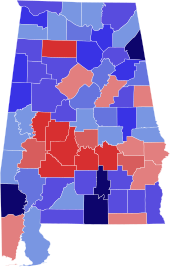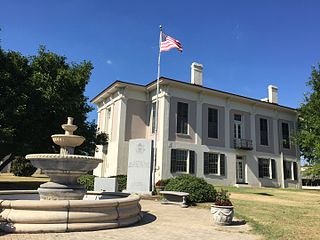
Greene County is a county located in the west central portion of the U.S. state of Alabama. As of the 2020 census, the population was 7,730, the least populous county in Alabama. Its county seat is Eutaw. It was named in honor of Revolutionary War General Nathanael Greene of Rhode Island.
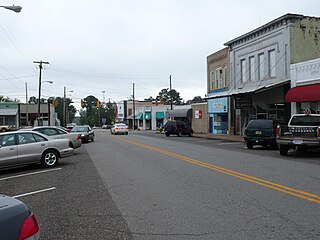
Eutaw is a city in and the county seat of Greene County, Alabama, United States. At the 2020 census, the population was 2,937. The city was named in honor of the Battle of Eutaw Springs, the last engagement of the American Revolutionary War in the Carolinas.

Robert Burns Lindsay was a Scots-American politician, elected as the 22nd Governor of the U.S. state of Alabama during Reconstruction, and serving one term from 1870 to 1872.

The 1870 South Carolina gubernatorial election was held on October 19, 1870, to select the governor of the state of South Carolina. Governor Robert Kingston Scott easily won reelection based entirely on the strength of the black vote in the state. The election was significant because white conservatives of the state claimed it showed that political harmony between the white and black races was impossible and only through a straightout Democratic attempt would they be able to regain control of state government.
The Election Massacre of 1874, or Coup of 1874, took place on election day, November 3, 1874, near Eufaula, Alabama in Barbour County. Freedmen comprised a majority of the population and had been electing Republican candidates to office. Members of an Alabama chapter of the White League, a paramilitary group supporting the Democratic Party's drive to regain political power in the county and state, used firearms to ambush black Republicans at the polls.

The 1964 United States presidential election in Alabama was held on November 3, 1964. Alabama voters chose ten representatives, or electors, to the Electoral College, who voted for President and Vice-president. In Alabama, voters voted for electors individually instead of as a slate, as in the other states.

The 1968 United States presidential election in North Carolina took place on November 5, 1968, and was part of the 1968 United States presidential election. Voters chose 13 representatives, or electors to the Electoral College, who voted for president and vice president. Whereas in the Deep South, Black Belt whites had deserted the national Democratic Party in 1948, in North Carolina, where they had historically been an economically liberalizing influence on the state Democratic Party, the white landowners of the Black Belt had stayed exceedingly loyal to the party until after the Voting Rights Act. This allowed North Carolina to be, along with Arkansas, the only state to vote for Democrats in all four presidential elections between 1952 and 1964. Indeed, the state had not voted Republican since anti-Catholic fervor lead it to support Herbert Hoover over Al Smith in 1928; and other than that the state had not voted Republican once in the century since the Reconstruction era election of 1872. Nonetheless, in 1964 Republican Barry Goldwater may have won a small majority of white voters, although he was beaten by virtually universal support for incumbent President Lyndon Johnson by a black vote estimated at 175 thousand.

Elections in Alabama are authorized under the Alabama State Constitution, which establishes elections for the state level officers, cabinet, and legislature, and the election of county-level officers, including members of school boards.

The 1920 United States presidential election in Alabama took place on November 2, 1920, as part of the 1920 general election, in which all 48 states participated. Alabama voters chose twelve electors to represent them in the Electoral College via popular vote pitting Democratic nominee James M. Cox and his running mate, Assistant Secretary of the Navy Franklin Roosevelt, against Republican challenger U.S. Senator Warren G. Harding and his running mate, Governor Calvin Coolidge.

The 1968 United States presidential election in Alabama was held on November 5, 1968. In Alabama, voters voted for electors individually instead of as a slate, as in the other 49 states.

The 1980 United States presidential election in Mississippi took place on November 4, 1980. All fifty states and The District of Columbia were part of the 1980 United States presidential election. Mississippi voters chose seven electors to the Electoral College, who voted for president and vice president.
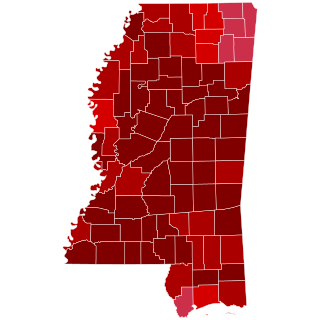
The 1964 United States presidential election in Mississippi was held on November 3, 1964, as part of the 1964 United States presidential election, which was held on that day throughout all fifty states and the District of Columbia. Voters chose seven electors, or representatives to the Electoral College, who voted for president and vice president.

The 1968 United States presidential election in South Carolina took place on November 5, 1968. All 50 states and the District of Columbia were part of the 1968 United States presidential election. South Carolina voters chose 8 electors to the Electoral College, who voted for president and vice president.

The 1948 United States presidential election in Alabama was held on November 2, 1948. Alabama voters sent eleven electors to the Electoral College who voted for President and Vice-President. In Alabama, voters voted for electors individually instead of as a slate.
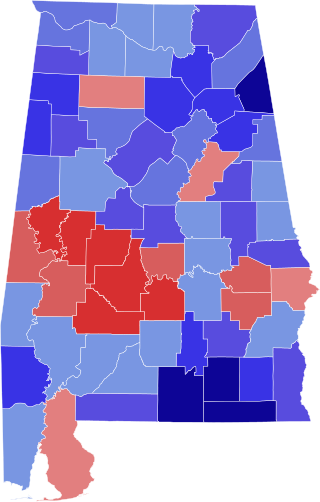
The 1874 Alabama gubernatorial election took place on November 3, 1874, in order to elect the governor of Alabama. Incumbent Republican David P. Lewis unsuccessfully ran for reelection, losing to Democratic former U.S. Representative George S. Houston. This election would end an era of serious competition between the local Democratic and Republican parties, and start a 112-year win streak for Democrats in the gubernatorial level.
The Eutaw riot was an episode of white racial violence in Eutaw, Alabama, the county seat of Greene County, on October 25, 1870, during the Reconstruction Era in the United States. It was related to an extended period of campaign violence before the fall gubernatorial election, as white Democrats in the state used racial terrorism to suppress black Republican voting. White Klan members attacked a Republican rally of 2,000 black citizens in the courthouse square, killing as many as four and wounding 54.
Alexander Boyd was notable as the Republican County Solicitor and Register in Chancery of Greene County, Alabama in 1870 during Reconstruction who was murdered by a lynching party of Ku Klux Klan members. He was fatally shot on March 31, 1870 in Eutaw, the county seat. The Klan members apparently intended to hang him in the square in a public lynching, to demonstrate their power during this period and their threat to Republicans.

The 1968 United States presidential election in Mississippi was held on November 5, 1968. Mississippi voters chose seven electors, or representatives to the Electoral College, who voted for President and Vice-President. During the 1960s, the Civil Rights Movement dictated Mississippi's politics, with effectively the entire white population vehemently opposed to federal policies of racial desegregation and black voting rights. In 1960, the state had been narrowly captured by a slate of unpledged Democratic electors, but in 1964 universal white opposition to the Civil Rights Act and negligible black voter registration meant that white Mississippians turned almost unanimously to Republican Barry Goldwater. Goldwater's support for "constitutional government and local self-rule" meant that the absence from the ballot of "states' rights" parties or unpledged electors was unimportant. The Arizona Senator was one of only six Republicans to vote against the Civil Rights Act, and so the small electorate of Mississippi supported him almost unanimously.

The 1934 Wisconsin gubernatorial election was held on November 6, 1934. Primary elections were held on September 18, 1934. Incumbent Democratic Governor Albert G. Schmedeman was defeated by Progressive nominee Philip La Follette.

The 1870 Delaware gubernatorial election was held on November 8, 1870. Incumbent Democratic Governor Gove Saulsbury was unable to seek re-election. Former State Senator James Ponder ran as the Democratic candidate to succeed Saulsbury and faced Republican nominee Thomas B. Coursey. As Black Delawareans gained the right to vote, Republicans were confident about their chances, and the Democratic Party responded by presenting itself as the "white man's party." Ponder ultimately defeated Coursey by a wide margin, in part because of low Black turnout and a racist backlash against Black suffrage.
